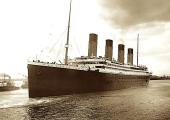How They Built the Titanic, Channel 5 review - the great liner revisited again, but why now?

It's always a great story, but this didn't tell us anything new
The appalling fate of the allegedly unsinkable liner Titanic in 1912 has fuelled endless feature films and documentaries, not to mention a dismal drama series by Julian Fellowes (there was also a proposed Titanic II vessel which would have been built in China, but which remains mysteriously un-launched). However, it’s difficult to see why this film has appeared 107 and a half years after she sank.







 Isabelle Aboulker: Mélodies/Songs en français and in English Julia Kogan (soprano), Isabelle Aboulker (piano) (First Hand Records)
Isabelle Aboulker: Mélodies/Songs en français and in English Julia Kogan (soprano), Isabelle Aboulker (piano) (First Hand Records)

